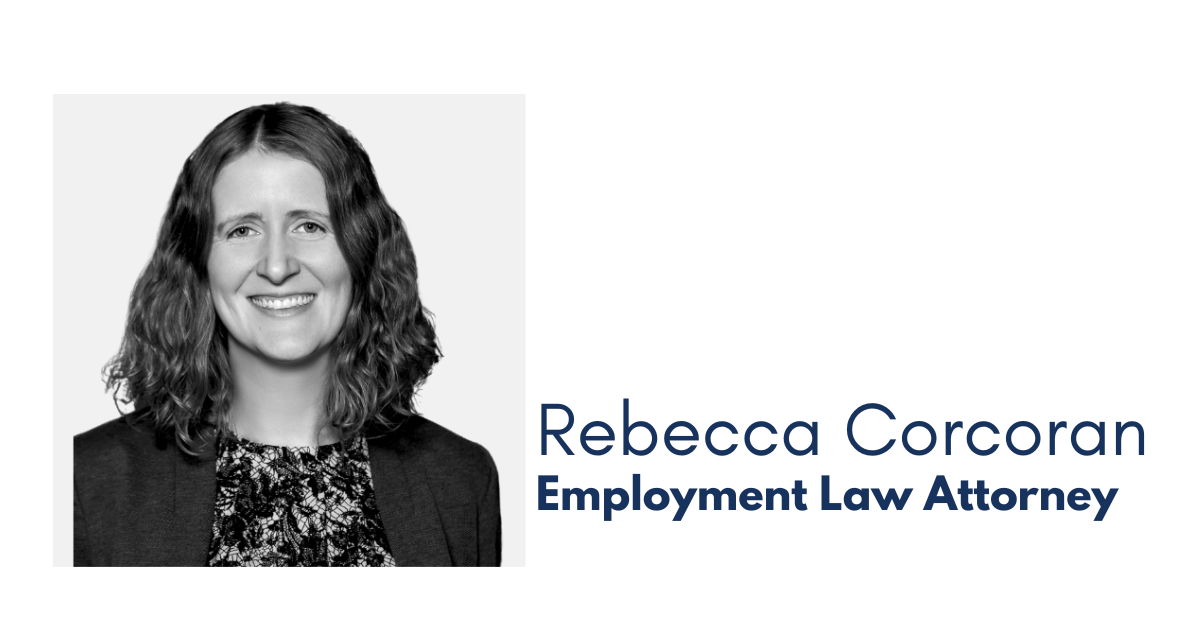Perspectives
Interview with Employment Attorney-Rebecca Corcoran
In celebration of Small Business Month, WFJ is spotlighting the legal insights that matter most to growing companies by sitting down with one of our trusted employment law attorneys, Rebecca Corcoran. With a deep understanding of the challenges small businesses face, Rebecca brings a practical, relationship-driven approach to legal guidance. From common compliance pitfalls to proactive policy planning, this interview offers timely advice for small business owners looking to protect their teams, their operations, and their futures.

What is your favorite part about working with small business clients?
My favorite part is the direct, collaborative relationships I build with small business owners. I appreciate their passion and agility, and I enjoy being their legal sounding board-whether it’s helping them interpret evolving employment laws or brainstorming practical policy updates. There’s a real impact in knowing my guidance helps foster workplaces that are no only compliant, but also fair and sustainable.
If you could give one piece of legal advice to someone starting a new business, what would it be?
Start strong by setting up foundational policies-especially around wage and hour practices, leave policies, and anti-discrimination protections. Even if you only have a few employees, clear and legally sound practices prevent problems down the line. Don’t wait until there’s an issue to call an attorney-proactive compliance is always more cost-effective than crisis management.
What are some of the most common mistakes you see small businesses make when it comes to employment law?
A common and growing issues is how businesses handle state mandated paid sick leave. Many employers try to roll it into an existing PTO policy without realizing that these laws often include strict accrual, usage, and carryover rules that differ from standard PTO. If policies aren’t updated to reflect the specific legal requirements-like tracking hours worked for accrual purposes or allowing sick time to be used for safe time or caregiving-it can lead to unintentional violations and employee complaints. It’s not enough to be gnerous with time off; compliance requires structure and documentation.
What’s one thing business owners often overlook in their employee handbooks or workplace policies?
They often fail to update policies as requirements and legal definitions evolve. Many handbooks rely on outdated boilerplate language. For example, it’s common to see protected class definitions that overlook newly recognized statuses like gender identity, genetic information, or marital status in certain jurisdictions. This omission not only undermines inclusivity but also weakens the company’s position in the event of a complaint or legal challenge. A well-drafted handbook is more than a formality-it’s a reflection of the company’s values and frontline defense against liability.
How can small businesses stay compliant with employment laws without having a full in-house HR team?
Work with an outside advisor who understands both legal compliance and business operations. I provide clients with scalable tools like policy templates, customized handbooks, and scheduled check-ins so they’re not blindsided by new laws. I also help them weigh what’s legally required versus what’s good for morale-those soft issues matter just as much when you’re building culture and retaining talent.
What’s one of your favorite small businesses?
That’s a tough one-there are so many inspiring businesses. But I really admire locally owned shops that double as community hubs. I have a special appreciation for client-focused providers like wellness clinics or local outdoor gear shops. Their missions often center around community and lifestyle, and it’s rewarding to help them grow while staying true to their values.